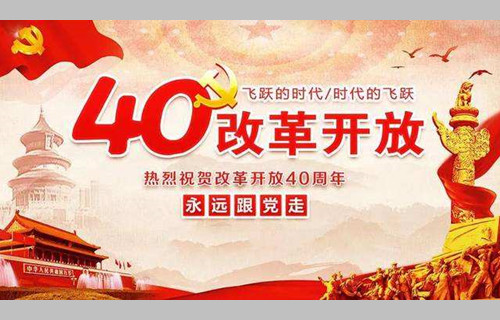中国正在庆祝改革开放四十周年,纪念1978年以来脱离毛泽东路线,跟随邓小平,实施改革开放和中国特色社会主义市场经济政策,给中国人民带来的收入增长和繁荣稳定。

China is now in full celebration mode, commemorating four decades since it turned away from Mao Zedong Thought and toward Reform and Opening Up — the blend of market and socialist policies initiated in 1978 by Deng Xiaoping that the Communist Party credits for “giving the Chinese people growth and prosperity.”
中国正在庆祝改革开放四十周年,纪念1978年以来脱离毛泽东路线,跟随邓小平,实施改革开放和中国特色社会主义市场经济政策,给中国人民带来的收入增长和繁荣稳定。
Around China, state media, schools, museums, even the Beijing Symphony Orchestra, are hailing the “correctness” of the country’s development path. Foreign delegations are engaged in “fact-finding tours and seminars”that tell a “million” stories about Reform and Opening Up and admiring the “major exhibition” at the National Museum of China. The festivities also include an international component to promote what President Xi Jinping called “a new option for other countries and nations who want to speed up their development while preserving their independence.” At one such conference a British scholar declared that Chinese socialism has offered the world “a new example” and “a new possibility.”
在中国各地,官方媒体、学校、博物馆,甚至北京交响乐团都在称赞中国发展道路的“正确性”。外国代表团正在进行“实况考察和研讨会”,讲述了“百万个”关于改革开放的故事,欣赏中国国家博物馆的“重大展览”。这些庆祝活动还包括国际庆祝活动,以推动习近平主席所说的“给予其他国家在保持独立、同时加快发展提供一个新选择”。在会议上,一位英国学者宣称中国特色社会主义为世界提供了“一个新的榜样”和“一种新的可能性”。
Myth No. 1: Low commune productivity led farmers to abandon collective agriculture and return to household farming.
神话1:低公社生产率导致农民放弃集体农业,回归家庭农业。
This simply wasn’t the case. Newly uncovered national, provincial and county-level data on grain and pig production reveal that sizable and sustained increases in agricultural productivity began after the 1970 Northern Districts Agricultural Conference. Under Premier Zhou Enlai’s leadership, this six-week gathering initiated extensive reforms of the collective remuneration and agricultural research and extension systems that made the commune far more productive in the 1970s than it was in the previous decade.
事实并非如此。新解密的国家、省级和县级的粮食和生猪生产数据显示,1970年北方地区农业会议之后,农业生产率开始大幅持续增长。在周恩来总理的领导下,这次为期六周的会议启动了集体薪酬、农业研究和推广体系的广泛改革,使农村公社在上世纪70年代的生产效率远远高于前十年。
Myth No. 2: The government allowed rural markets and private enterprises only after Reform and Opening Up.
神话2:改革开放后,政府才允许农村市场和民营企业进入。
“The private economy disappeared in China for more than two decades until the Third Plenum … in 1978, which approved the restoration of a non-public economic sector,” the South China Morning Post recently reported. This too is incorrect. After 1961, private household production, small-scale animal husbandry and cottage industries, and rural markets , collectively known as the Three Small Freedoms (三自), were legal and commonplace throughout the Chinese countryside. Rural markets were an important outlet for excess sideline production (except grain), which was households’ primary source of vegetables, protein, and cash. After 1978, rural markets and private enterprises were greatly expanded in size and scope.
《南华早报》最近报道称:“民营经济在中国消失了20多年,直到1978年的三中全会……批准恢复非公有制经济。”这也是不正确的。1961年之后,私人家庭生产、小规模的畜牧业和土地产业、和农村市场(赶集),统称为三个小的自由(三自),在法律允许下的整个中国农村很常见。农村市场是副业生产过剩(谷物除外)的重要出口,而副业生产是家庭蔬菜、蛋白质和现金的主要来源。1978年后,农村市场和民营企业的规模都有了极大的扩张。







